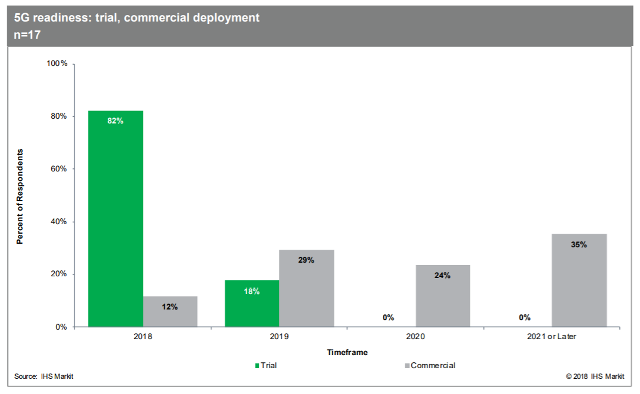Some of the top telecom operators in Europe are gearing up to launch 5G services without making much increase in investment in networks.
 The new Capex focus is driven by the demand for creating value from their network investments.
The new Capex focus is driven by the demand for creating value from their network investments.
France, Britain and Italy have already held 5G spectrum auctions. Germany will auction 5G spectrum in the new-year.
Mobile operators, which are facing hyper competition to retain their wireless subscribers, are spending for fiber-optic cables and looking to densify their networks to guarantee latency for 5G services.
European mobile service providers aren’t raising capital investment, telecoms bosses told the Morgan Stanley European Technology, Media and Telecoms conference in Barcelona this week, Reuters reported.
Many operators are preparing their mobile towers for sale or signing partnerships with infrastructure companies that would run them in exchange for fees. The idea is to raise funds from the sale of telecom towers. They expect 5G will start generating revenue streams.
GSMA has already warned that Europe lags the United States and parts of Asia on rolling out 5G services for providing wireless broadband to the home and powering connected factories or machines.
GSMA has also revealed that telecom operators should focus on enterprise business to create value from their 5G network investment. Focusing on connectivity services for retail users will not be sufficient for generating returns from 5G.
“5G may be the trigger for deals,” Tobias Martinez Gimeno, CEO of Spain’s Cellnex, said. Cellnex has telecom tower portfolios in France, Spain, Italy and the Netherlands, and is keen to move into new markets like Germany.
Deutsche Telekom CEO Tim Hoettges said the market leader in Europe’s largest economy is folding its assets in Dutch and Austria into its towers unit, which runs 28,000 base stations. The company is willing to consider a sale of the telecom tower business.
Vodafone CEO Nick Read said that the telecom operator, which made a huge loss due to the merger of its India business with rival Idea Cellular, could increase the utilization of assets such as the 58,000 masts in Europe by encouraging rival operators to use them or selling a stake to an operator.
Vodafone already has a towers joint venture in Britain.
Tower operators such as America Tower Company offer an interesting proposition because their business can be expected to offer predictable revenue growth on the back of rising data volumes.
Those cash flows can support higher financial leverage, and as a result potential returns. That makes tower deals potentially attractive to telcos, enabling them to realize a capital gain on their physical assets at a time when they are struggling to eke out revenue growth in Europe’s mature markets.
Potential new entrants to the European towers market are taking a close look, such as Crown Castle, a US real estate investment trust that runs 40,000 towers in the United States and Puerto Rico. Crown Castle, with a market capitalization of $46 billion, is worth more than Orange, the biggest telco in France.
Crown Castle finance chief Daniel Schlanger said the telecom tower company is interested in gaining exposure to developed markets in Western Europe, where it sees a favorable trade-off between risk and reward compared with emerging markets,.
Telecoms are looking at ways of sharing infrastructure to limit the cost of 5G investments.
Telefonica Deutschland has struck a deal to connect 5,000 of its base stations to Deutsche Telekom’s fiber-optic network in Germany.
That will enable the German market No.3 to look at offering 5G fixed wireless broadband, following the launch of such a product by U.S. market leader Verizon in four cities last month.
“We’ve looked at the Verizon case and it’s feasible,” Telefonica Deutschland CEO Markus Haas said. Telefonica Deutschland has conducted a pilot project in the city of Hamburg for its 5G services.
Markus Haas said Telefonica Deutschland will not raise investments to cover 5G network investments. Markus Haas said he was comfortable with existing guidance that Telefonica Deutschland’s Capex would be stable in the years to come.
Orange CFO Ramon Fernandez said that the company’s Capex will peak at 7.4 billion euros this year as part of an understanding with the French government to improve networks in exchange for the favorable terms under which 5G spectrum was allocated.
